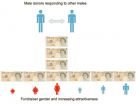Experiments in mice and human cells have shown that the protein promotes the proliferation of cytotoxic T cells, which kill cancer cells and cells infected with viruses. The discovery was unexpected because the new protein had no known function and doesn't resemble any other protein.
Researchers from Imperial College London who led the study are now developing a gene therapy designed to boost the infection-fighting cells, and hope to begin human trials in three years.
The study also involved researchers at Queen Mary University of London, ETH Zurich and Harvard Medical School. Their discovery, which has been six years in the making, is reported today in the journal Science.
Cytotoxic T cells are an important component of the immune system, but when faced with serious infections or advanced cancer, they are often unable to proliferate in large enough quantities to fight the disease.
By screening mice with genetic mutations, the Imperial team discovered a strain of mice that produced 10 times as many cytotoxic T cells when infected with a virus compared with normal mice. These mice suppressed the infection more effectively, and were more resistant to cancer. They also produced more of a second type of T cells, memory cells, enabling them to recognise infections they have encountered previously and launch a rapid response.
The mice with enhanced immunity produced high levels of a hitherto unknown protein, which the researchers named lymphocyte expansion molecule, or LEM. They went on to show that LEM modulates the proliferation of human T cells as well as in mice.
The researchers now aim to develop a gene therapy designed to improve immunity by boosting the production of LEM. With the support of Imperial Innovations, the technology commercialisation company for the College, the researchers have filed two patents. A company called ImmunarT has been formed with the aim of commercialising the technology.
Professor Philip Ashton-Rickardt from the Section of Immunobiology in the Department of Medicine at Imperial, who led the study, said: "Cancer cells have ways to suppress T cell activity, helping them to escape the immune system. Genetically engineering T cells to augment their ability to fight cancer has been a goal for some time and techniques for modifying them already exist. By introducing an active version of the LEM gene into the T cells of cancer patients, we hope we can provide a robust treatment for patients.
"Next we will test the therapy in mice, make sure it is safe and see if it can be combined with other therapies. If all goes well, we hope to be ready to carry out human trials in about three years."
Dr Claudio Mauro, who led the research from the Centre for Biochemical Pharmacology, based within Queen Mary University of London's William Harvey Research Institute, said: "This study has identified the novel protein LEM and unlocked an unexpected way of enhancing the ability of our immune system to fight viruses or cancers. This is based on the ability of the protein LEM to regulate specific energy circuits, and particularly mitochondrial respiration, in a subset of white blood cells known as cytotoxic T cells. This discovery has immediate consequences for the delivery of innovative therapeutic approaches to cancer. Its ramifications, however, are far greater as they can help explaining the biological mechanisms of widespread human diseases involving altered immune and inflammatory responses. These include chronic inflammatory and autoimmune disorders, such as atherosclerosis and rheumatoid arthritis."
The research was funded by the Medical Research Council, the Wellcome Trust and the British Heart Foundation.
Dr Mike Turner, Head of Infection and Immunobiology at The Wellcome Trust, said: "The discovery of a protein that could boost the immune response to not only cancer, but also to viruses, is a fascinating one. Further investigation in animal models is needed before human trials can commence, but there is potential for a new type of treatment that capitalises on the immune system's innate ability to detect and kill abnormal cells."
INFORMATION:
For more information please contact:
Sam Wong
Research Media Officer
Imperial College London
Email: sam.wong@imperial.ac.uk
Tel: +44(0)20 7594 2198
Out of hours duty press officer: +44(0)7803 886 248
Notes to editors:
1. I. Okoye et al. 'The protein LEM promotes CD8+ T cell immunity through effects on mitochondrial respiration.' Science, 16 April 2015.
To obtain the paper, please contact AAAS at +1-202-326-6440 or scipak@aaas.org
2. About Imperial College London
Imperial College London is one of the world's leading universities. The College's 14,000 students and 7,500 staff are expanding the frontiers of knowledge in science, medicine, engineering and business, and translating their discoveries into benefits for society.
Founded in 1907, Imperial builds on a distinguished past - having pioneered penicillin, holography and fibre optics - to shape the future. Imperial researchers work across disciplines to improve global health, tackle climate change, develop sustainable energy technology and address security challenges. This blend of academic excellence and its real-world application feeds into Imperial's exceptional learning environment, where students participate in research to push the limits of their degrees.
Imperial nurtures a dynamic enterprise culture, where collaborations with industrial, healthcare and international partners are the norm. In 2007, Imperial College London and Imperial College Healthcare NHS Trust formed the UK's first Academic Health Science Centre. This unique partnership aims to improve the quality of life of patients and populations by taking new discoveries and translating them into new therapies as quickly as possible.
Imperial has nine London campuses, including Imperial West: a new 25 acre research and innovation centre in White City, west London. At Imperial West, researchers, businesses and higher education partners will co-locate to create value from ideas on a global scale.
http://www.imperial.ac.uk
3. About the Wellcome Trust
The Wellcome Trust is a global charitable foundation dedicated to improving health. We provide more than £700 million a year to support bright minds in science, the humanities and the social sciences, as well as education, public engagement and the application of research to medicine. Our £18 billion investment portfolio gives us the independence to support such transformative work as the sequencing and understanding of the human genome, research that established front-line drugs for malaria, and Wellcome Collection, our free venue for the incurably curious that explores medicine, life and art. http://www.wellcome.ac.uk





